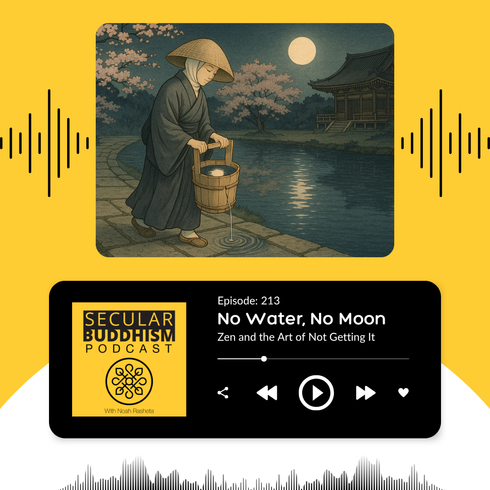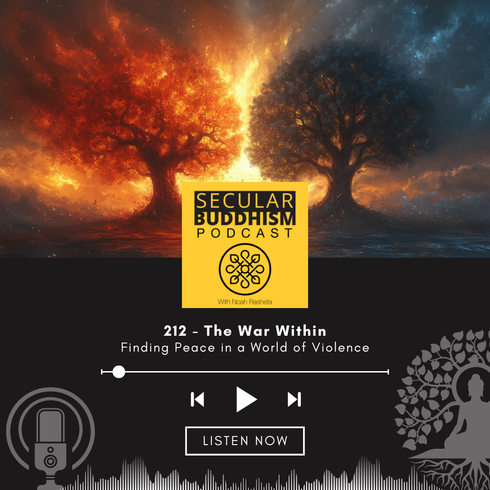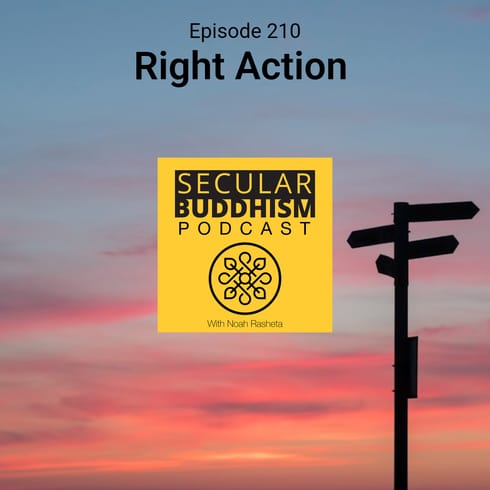
144 - The Game of Emotions
In this podcast episode, I will share some thoughts around the idea that we can change our relationship to our emotions by pretending that we’re playing a game where the goal is to experience the full range of possible emotions.
Koan: “There is Nothing I Dislike”
Transcript:
Hello, and welcome to another episode of the Secular Buddhism podcast. This is episode number 144. I am your host, Noah Rasheta. And today I’m going to talk a little bit about emotions. Keep in mind, you don’t need to use what you learn from Buddhism to be a Buddhist. You use what you learn to be a better, whatever you already are. If you’re interested in learning more about Buddhism, check out my book, No Nonsense Buddhism for Beginners. It’s available on Amazon. Or check out the first five episodes of the podcast and you can find those easily by visiting secularbuddhism.com and clicking on the link that says, start here. If you’re looking for a community to practice and to interact with, consider becoming a patron and visiting secularbuddhism.com and clicking on the link to join our community.
In this podcast episode, I wanted to talk a little bit about emotions and it’s been several weeks since I’ve had a chance to record a podcast, so I apologize for the delay. I have been interacting quite a bit with the online community and one of the topics that we talk about, or that we have been talking about, for a few weeks in a row now on our live Sunday discussion calls is the notion of emotions, how we experience emotions and the relationship that we have to emotions. And I wanted to share some of those concepts and some of the ideas that have come up in the last few weeks on our Zoom calls in the community.
So the idea here started with an experience I had not too long ago with a good friend of mine who has been struggling a lot with mental health issues and he spent a good portion of the year, probably the full year, just really battling depression, taking a lot of medication for anxiety and he ended up in this place where he was very numb and he was very numb for quite a long time. And as he slowly emerged out of this, in recent months, he was telling me that he had this really neat experience where he was suddenly upset about something, but he was experiencing a lot of gratitude in that moment because he realized, “I’m actually feeling something. I’m so excited that I’m mad because I’ve been numb for so long that it just felt good to feel something, even if that feeling was an emotion like anger.”
And after that interaction with him, it left me thinking about the relationship that we have with our emotions and how some of our emotions we cling after and we want more of, and other emotions, we shoo them away and we don’t want to experience them. But here in this experience that my friend had, suddenly he was very grateful to experience this emotion that normally he probably wouldn’t have wanted to feel because it had been absent for so long. And that got me thinking about the relationship that I have with my emotions and I think the Buddhist perspective of mindfulness with regards to our emotions. So I wanted to share some thoughts around this. One of the thoughts that developed for me was the notion that as we go through life, what if our goal was to just experience, take in every possible experience of what it means to feel alive, to experience life with the entire spectrum. If that was a game that I was playing, where I thought my goal is to experience all the emotions that one could experience. I want to experience those.
And then just to make the game more fun, let’s just say I wanted to experience those a certain amount of times per week. It would be interesting that if that were my goal, if that were the relationship I had with my emotions, when an emotion arises, let’s say gratitude or happiness, of course I would experience comfort around having that emotion, but what would happen when I experience anger or when I experience sadness? Sure, it would still be an unpleasant emotion, but there would almost be an aspect of gratitude that co-arises with the anger because I’d say, “Oh good. I’m experiencing anger. And I wanted to experience this X amount of times in this one day or X amount of times in this one week,” because again, if the game of emotions was that I want to experience every possible emotion, just that perspective shift would make me grateful that I’m experiencing anger, much like my friend who was experiencing anger and at the same time, joy or gratitude around the fact that he was experiencing anger because he was just grateful to be experiencing anything after that long period of time of numbness.
So I think that’s a really neat thought. And what it does for me, it helps me to remember that there are multiple layers of experience that are unfolding when we experience a thought or a feeling or an emotion. And I recently saw an image that was shared in our online community, by someone who presumably found it on social or somewhere, but he shared this image. And what the image conveys, it’s a little cartoon image and on the left, there’s a little cartoon that has the thought bubble and the thought says, “I’m not good enough,” and his face looks sad. And then on the right, there’s the thought bubble, same person, but it’s layered. So the inner layer, and then there’s an outer layer and then there’s a layer around the two, so three layers of thought. But in the outer one, it says, “I notice that,” and then in the inner one, “I’m having a thought that,” and then in the inner most one, “That I’m not good enough.”
So I thought that was a really neat visual way to understand mindfulness as a tool, how it pertains to the experience of having thoughts and feelings and emotions. So again, let’s say the thought arises, “I’m not good enough.” Mindfulness is I notice that I’m having the thought that I’m not good enough and because it comes in layered that way, the noticing of the thought is neutral and there’s no sadness in that. If I stay in the one layer of I’m not good enough, that’s sad, especially if you believe that thought. So I really liked that because it creates a layer of separation between the experience that you’re having and the observation of the experience that you’re having. And I think this has been talked about a few times in the podcast, but this is something that I wanted to talk about again, with this notion of the game of emotions.
If I am trying to take in the full experience of being alive, then that encompasses the broad range of every experience of being alive. That means when I experience having a flat tire or the loss of a loved on or the loss of a job, or the joy of watching a sunset or whatever the experience is that I’m having, I’m cataloging these as, wow, I get to have another experience. Some will be pleasant, some won’t be pleasant, but it wasn’t about only having pleasant or avoiding unpleasant experiences. The game of emotions for me is I want to catalog all of them and I personally do this from time to time. And when I have a new experience that I haven’t had before, for instance, driving along the highway, I had a flat tire. Well, a semi-truck blew its tire and the tire rolled into my lane and I dodged it and it hit my trailer.
And when it did that, sure, I reacted and had all the thoughts and feelings and emotions that arise when you have an experience like that. But one that arose relatively quickly, once I pulled over was, huh, I’ve never had this experience. That’s… Put that on my list, like a little bucket list. Okay, I got that experience out of the way. Now I know what that feels like. And again, that sense of almost gratitude, co-arises with whatever other emotion that you’re having. A lot like my friend, again, experiencing a sense of, of gratitude or joy amidst the experience of feeling anger as an emotion. So I think that’s a fun concept that you can take and play with that. What if you were committed to accepting the full range of experience of being alive and next time you experience any kind of emotion, any thoughts or feelings if you viewed it from that lens of I’m open to experience in all of them?
And if I really were tallying which ones I experienced and how often would there be a part of me that would be experiencing a little bit of joy around the fact that I’m experiencing discontent? Because I was like, “Oh, there, I got that one off the list. Anger, oh yeah. I felt that one this week. Okay, that one’s off the list.” Sadness, joy, all of them, right? You name it. I think it’s a fun thought experiment and I think it’s fascinating because again, it really plays on this notion that the experience of having an emotion is one thing, but the relationship you have to the emotion in many ways will influence whether you cling after or feel aversion towards that experience. And I think a lot of times we are caught up in this world where the underlying story that we tell ourselves or the underlying belief is that I should feel this and I shouldn’t feel that. I should feel more of this.
I should do whatever it takes to feel more of this and I should do whatever it takes to avoid feeling more of that. And we put the emotions in these two columns, right? The ones that we want and the ones that we don’t want. But what if the underlying belief that some feelings and emotions are good and some are bad, what if that was what was flawed and that belief is what’s causing an unskillful relationship with our emotions? What if the belief was, they’re all good and you’re supposed to feel all of them at some point. And until you do, you haven’t fully lived. If that were the belief, well, again, you’d find yourself experiencing an emotion saying, “Ah, okay. Yeah, that’s not pleasant, but I’m going to put this on my little list. Put a little check mark next to it because yay, I finally got to experience that.” It’s just a fascinating thought experiment.
So that’s the idea of the game of emotions that I wanted to share in this podcast episode. And what I hope is that you’ll consider this next time you’re experiencing a strong emotion and ask yourself what relationship do I have to this emotion? And if I were just chalking these up on a list, would you feel any kind of gratitude or joy around the fact that you are actually feeling that emotion, however, unpleasant that emotion may be? I think so. At least that’s what I’ve experienced in my own… In my own sampling of this as a concept and as an idea. So that’s what I wanted to share with you. I also want to reintroduce the Cohen___ at the end of the podcast episode to give you something to think about with regards to next week’s podcast episode.
So this koan, I believe I’ve shared it before, but it’s probably been long enough that it’s worth sharing again. And just on that side note, I do want to emphasize the fact that because you are always changing and life is always changing, anytime you encounter a concept or an idea or a teaching in Buddhism, it’s like you’re encountering it for the first time, because you’re not the same person who encountered this last time you encountered it. So that’s a fun thought. But the koan is this, there is nothing I dislike and that’s it. That’s the koan. I’ll share some of my thoughts on that next week. Hopefully you will stew on that for a little bit and give that some thought and see, what does that mean to you? The expression there is nothing I dislike, as a koan. All right. Well, that’s all I have for this podcast episode. Thanks again for tuning in and I look forward to recording another podcast episode soon.
I’m excited to be back on track, trying to stay caught up. I have been on the road quite a bit the last few weeks, but I’m hoping to have time to get caught up on several podcast topics that I have written down that I’ve been ready to share with you. Thanks again for taking the time to listen. Until next time.



